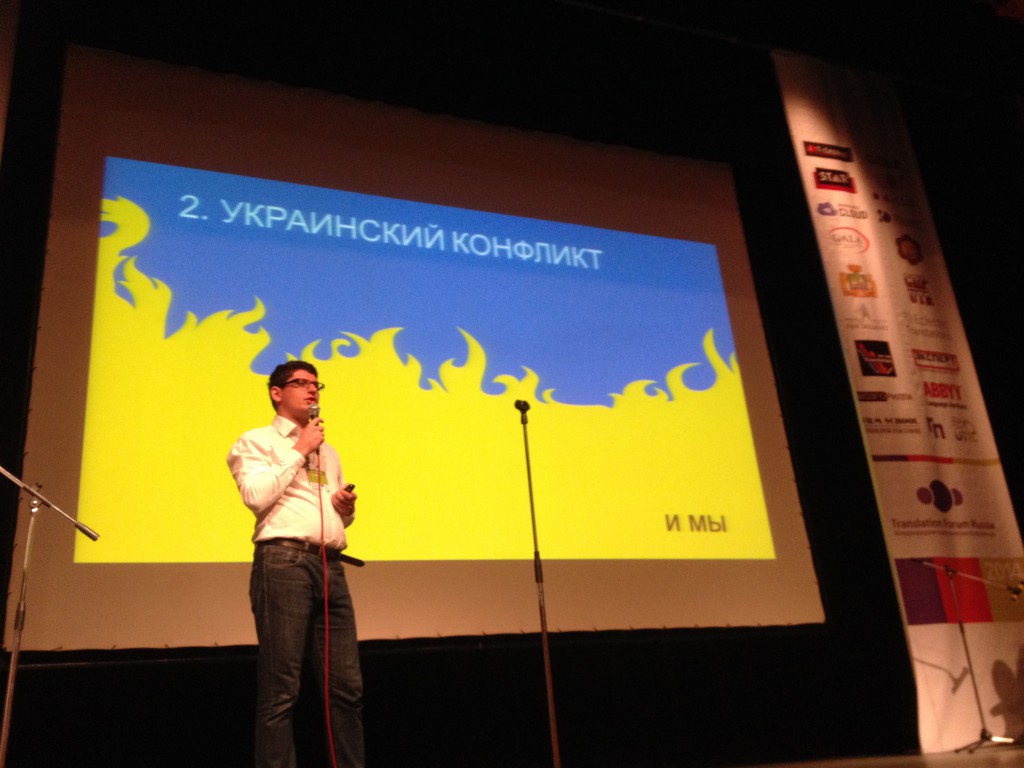Translation Forum Russia: the power of translators is in our unity!


Fedor Kondratovich shares a review about the recent Translation Forum Russia conference that took place in September
Although this report does not claim a full event coverage because I was unable to personally visit all the parallel presentations (Full program of activities ), I am pleased to share with the readers my experience of visiting the largest event the Russian translation industry — Translation Forum Russia 2014, which took place in Ekaterinburg.
To start, here is my assessment of the Conference organization as a whole, its strengths and weaknesses.
Strengths:
1) There ware a lot of interesting presentations.
2) It was at a large venue with a sufficient numbers of rooms for all the activities and comfortable networking.
3) All the staff were very polite including the coat room attendants (even surprisingly polite for our standards).
4) I enjoyed the networking, I met a lot of smart and interesting people.
5) I appreciated a highly professional environment, which allowed me to relax at the same time.
6) The weather was good.
7) The Conference happened, which is a lot of work!
8) There was a large number of representatives from direct customers, who are quite a valuable “commodity” at an event like this, as we all know. However, this is beneficial for translation service providers (it is possible that the customers would be interested in the opposite situation).
9) There was a large number of higher education professors, which is a good indication of a smart conference.
10) There were no political debates. In my view, in our difficult time, it is the indicator of a high professionalism and respect to colleagues who may have different views. At least, I have not heard such discussions.
Weaknesses (listed considering the Strength #7, which already offsets all the Weaknesses, as something can always go wrong, but it wasn’t a case at all—the event was a clear success):
1) The lack of a functioning Wi-Fi .
2) Problem with a transfer. They forgot to pick up someone at the airport. Buses from the Park Inn hotel were 15-20 minutes behind schedule, and it was very stuffy on the buses. Considering the daily afterparty of this merry translation community, these 15 minutes of delay were particularly unwelcome 🙂
3) The registration process and the work of the reception were not well thought through. It felt like all the issues were resolved by only one table, and Leona in particular (we thank you for all your work), although there were two more staff tables, which were not very busy. As a result, you could replace your lost badge, pay for the gala or business lunches, or sort out another issue only after having waited in line. Time is money, by the way.
4) The lack of a clear concept of how the four presentation halls should have functioned. It would be desirable if each room had one general topic. It would have been much easier to navigate, and there would be much less running around.
5) Badges! Some 2/3 of participants had badges without the company name. Since we are on this topic, I will note that the font should be as large as possible.
6) The gala was a bit pricey (in my opinion), this is why many people did not attend it.
Moving on to the conference itself.
At the entrance to the building of Ural culture center, there was a banner saying “Logrus—your guide on the Silk Road”. Aside from its psychedelic language, I felt confused who shall do what on the Silk Road (“Promotion and work on the markets of the Middle and Far East, Central and South Asia”). At least, I did not meet many translators of Thai, Kazakh or Chinese at the Forum. There are some concerns that this road will be a lot more arduous than it seems for the Western interpreters.
There were two representatives of the City authorities, who gave the general introductory remarks, which were as controversial and vague as, perhaps, and the quality of the government officials work in our country as a whole. After the phrase of Sergey Tushin, the Deputy Head of Ekaterinburg City Administration, “I wish that you, translators, did not exist as a class”, there was little incentive to hear his discourse related to the dream of a high-level language training for all; the negative message was too hard to overcome (although, Irina Alekseeva later rebutted the core of this argument as follows: the knowledge of a languages does not equal a skill to translate). However, when the Foreign Ministry representative Alexander Kharlov in his speech repeatedly stressed a titanic complexity of the job of an interpreter, the hall automatically filled up with the positive feedback of gratefulness. Yes, this is how one should speak at an industry event giving an official welcome. This tone of the message was similar to the one made by the United States General Consul Otto Hans Van Maerssen, who recalled an episode of its life, when he forgot to invite an interpreter and had to perform the duties himself; this served him a life-long lesson of how serious the job of an interpreter was.
After the scheduled welcome message by Olga Yegorova, FIT Board Member (Russian geopolitical advantages, the Shanghai Cooperation, Human Rights resolution on protection of interpreters in conflict zones), Larisa Korneeva, the Head of Sverdlovsk Union of Translators of Russia, and a coffee-break, the floor was passed to Ukrainian colleagues from UTIC: “We hope that Ukraine will soon turn to the path of creation”. This sounded very sincere. Thank you, UTIC!
It was then followed by two most interesting presentations, which, of course, deserve our attention.
Irina Aleskeeva: Translator and time.
The main points:
1) Since the early 90s and until now, the industry has undergone tremendous changes. But there are some constant goals of translation, which have remained since the ancient times (overcoming barriers, reduction of aggression, agreements, dissemination of information).
2) Many myths about the translation are gone these days. For example, nobody thinks today that:
—It is sufficient to know a foreign language well to be able to translate.
—Translators know their native language by default. In fact, the native language is a “business card” of any translator or interpreter.
—The literary translation is the most complicated one. It turned out, there are other types of texts, and they are more difficult.
—The simultaneous interpretation is the hardest one. This is also not true, and professionals in this area can confirm that.
3) The industry has consolidated.
There is now an awareness that it (the industry) exists, TRF is a proof of that. Many important decisions were made here.
4) among them was the creation of independent organizations (UTR, NLT).
There are government initiatives to support the translation industry. There is now the Institute for Literary Translation established in Moscow, which utilizes grants (literary translation of Russian literature into foreign languages).
There are different competitions among translators.
5) The industry is becoming more technology-savvy.
This is a clear strength, but there are also some weaknesses so it. Google translation is very problematic in serious cases. In a well-known online dictionary Multitran, for example, not a single legal term is translated correctly.
6) We are undergoing a change of the language norms.
We have become more tolerant to errors, we forgive each other our level of English, as most people use it as a foreign language anyway.
As it happens today, in many respects a translator acts as a language guardian due to the neutrality of the profession.
7) About the quality of the interpreting, it is quite high, and Sochi Olympics were a proof of that.
8) About the quality of the written translation, it seems to be very low.
Why is it so? We do teach it badly? Are we taught the wrong things? Are we taught by wrong people? It is a difficult question, but the conclusion, although sad, is of a moral nature— translators don’t work hard on themselves. Is simply not enough to soak up information; one needs to undertake serious professional, mental and ethical steps for self-improvement. Otherwise, interpreters respect themselves more than they respect their customers.
There are enthusiasts, who come to rescue in this situation to a certain degree, for example, like the organizing committee of this Forum.
You may agree, that is an exhaustive and when a very fresh point of view. In the light of point 8, for example, the never ending talk about the low rates of interpreters and translators receives a somewhat different twist.
Konstantin Dranch: The Russian translation market overview
The main points:
1) The decrease of macroeconomic indicators in Russia (the drop of the dollar, the decline in foreign trade, the raise of inflation rate).
2) Negative consequences of deteriorating relations with Ukraine (Ukrainian translators want less work with our translation bureaus, a decrease in interpreting orders, closing of Russian translation offices in the Eastern Ukraine, a blow to the image of the Russian language as a whole).
3) The only “strength” is the translation of Ukrainian passports.
4) International projects are being frozen (including oil-related; SAP disbanded the entire localization division of 12 people; Cisco revenue has fallen in Russia by 24%).
5) According to a study by trаnslаtiоnrаting.ru , the largest share of the translation market is in the price segment of 6-10 cents per word! This means that selling cheap is not necessarily selling much!The Russian translation market size is 627 million dollars a year.
6) ABBYY won the largest bid of 175 million rubles. This is mainly due to a high technological level of the company (mentioned in the report on this bid).
Then, Uwe Мuegge in his presentation made a comparison between an interpreter and a bicyclist—one must be fast, overcome obstacles, and have the right technology tools (good bicycles are expensive), and work as a team; from my point of view, we did not hear anything new there.
After that I was torn in my preferences, as most of the participants, between Yandex session on creating technical documentation (“Hyperbaton“) and the audio-visual translation session in the Blue Hall; I ended up running between these two.
Yandex was a pleasant surprise both because of the presentation quality, and the preparation thoroughness—presenters were accompanied by an impressive support group (technical audio-video help, handing out informational fliers, questionnaires, explanations for attendees). From the history of Help service (since 2004), and principles of work by Yandex technical writers (no advertising; brief and clear; explain ambiguous; answer questions; what and why first, followed by how; follow a special style and formatting guide, and templates) we moved to a very interesting topic for translators: principles of a simplified Russian language (similar to the Simplified Technical English, designed originally for the aerospace industry, and used today by many large companies) to enable an easy translation of documentation. The objective here is the maximum clarity and ease of the language usage. For example, it is:
—Using the Past Simple instead of the Present Perfect;
—Using a word in only one syntax function (“work” is “a work”, but not “to work”);
—Creating a list of “bad” words (those that have too many meanings; for example, a preposition “concerning”)
—Avoiding synonyms;
—Avoiding a chain of nouns ( “external information carriers security provision… “);
—Use a structure “to + verb” instead of gerunds ( “to limit” instead of “limiting”);
– Use only the direct order of the words.
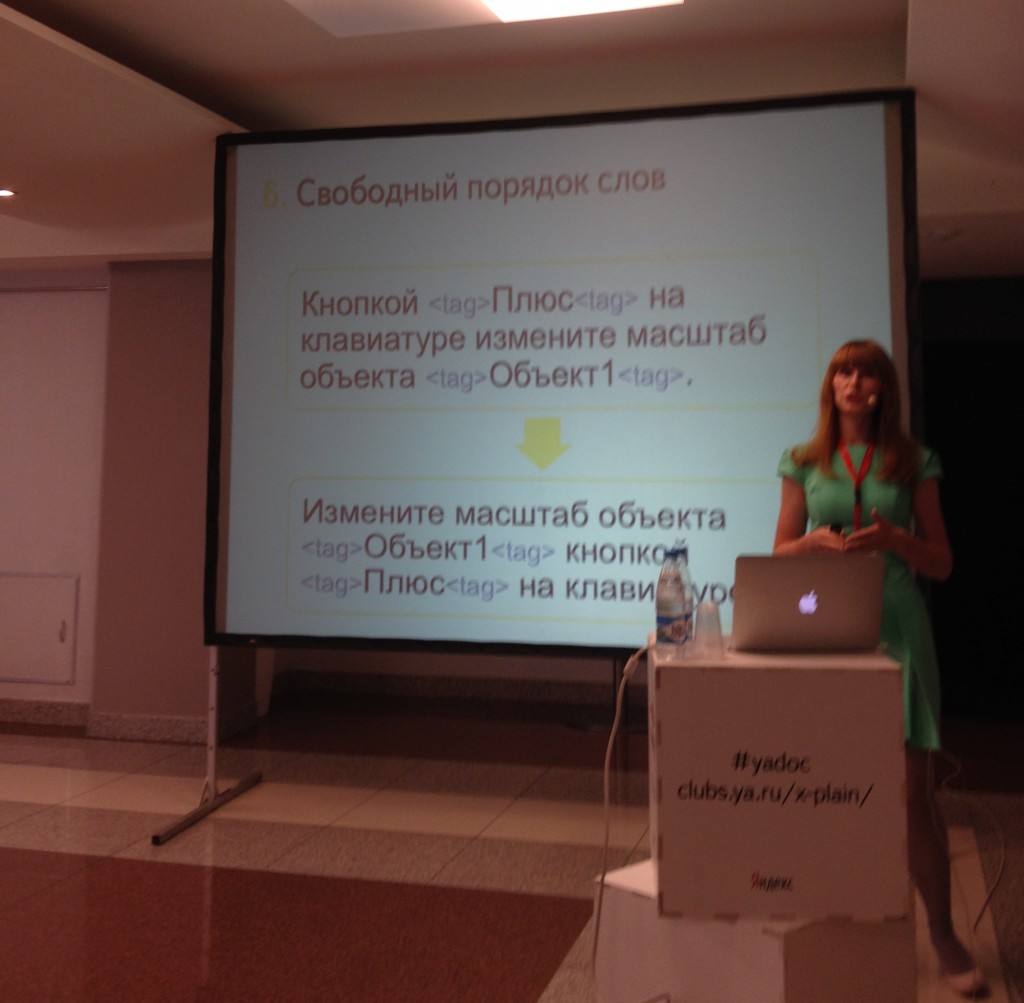

It is clear that this concerts the technical documentation for the internal use only, and does not apply to marketing texts, which would not be fun to read if written like this. But the machine translation effectiveness, according to the presenter, in case of the simplified Russian increases up to 90%!
In addition to the application value of simplified languages, I personally find this experiment interesting in ways of “feeling” for a notional feasibility and notional boundaries of a natural (complex) language.
In the meantime, the hall with the audio-visual translation covered the complexity of translating subtitles. It would seem that subtitles are just a transcript, a recording of speech, but there are many details to consider (reading speed, clarity, communication) when translating subtitles. Professor Tiina Holopainen from the University of Turku presented it on a serious conceptual base (“subtitles concept” on 6 levels of a text functionality hierarchy: cultural, associated with an action, communicative, audio-visual, textual, verbal).
Thatcher Mines from the translation boutique “Eclectic Translations” gave the examples of translation of “Kikоriki” (“Smeshariki” in Russian) and “Leviathan” to eloquently prove (with return on investment figures) that it is not only efficient, but also mandatory to”go beyond a simple translation”: as a result, the translators of this company are not only invited to translate, but to develop dialog sheets, and are involved during the creation of new cartoon episodes. “Eclectic” also translate, do the adaptation (including non-native, considering a perception of an English text by non-native speakers), dubbing and subtitles (different for a movie and its trailer).
“Voshod” Creative Agency made me happy with the positive energy of their team (both in person and on film), the colorful asis commercials (“Bad ads are harmful to your health! “), which received many international awards. Attentive professionals from the audience mentioned that it was sometimes due to, and sometimes contrary to the quality of subtitles translation, that they opened a room for improvement. That, again, does not preclude overall work on the cultural adaptation of material.
This session was moderated by Alexey Kozulyaev, the Head of the School of Audio-visual Translation.
The Forum attendees were offered a brief tour of Ekaterinburg that evening. Considering the dusk, one can hardly call this a very good idea, and one could not retain much of what the guide said.
On Saturday morning (2day of the Forum), a networking session from Irina Rudakova tried to warm up the audience.
In the Blue Hall, Maxim Zamedyanskiy spoke about the success of interpreters at the Olympic Games: they had to work 24/7, and, notably, interpreters did not specialize if certain kids of sports, but translated universally in the sports framework assigned to them.
The presentation by Koji Maeda “Make your business successful by identifying the true NEEDS, hidden in details: using the example of West-East relations in Japan” seemed interesting to me from a philosophical point of view. The Japanese presenter described the psychological profile of the Eastern Japanese versus the Western Japanese.
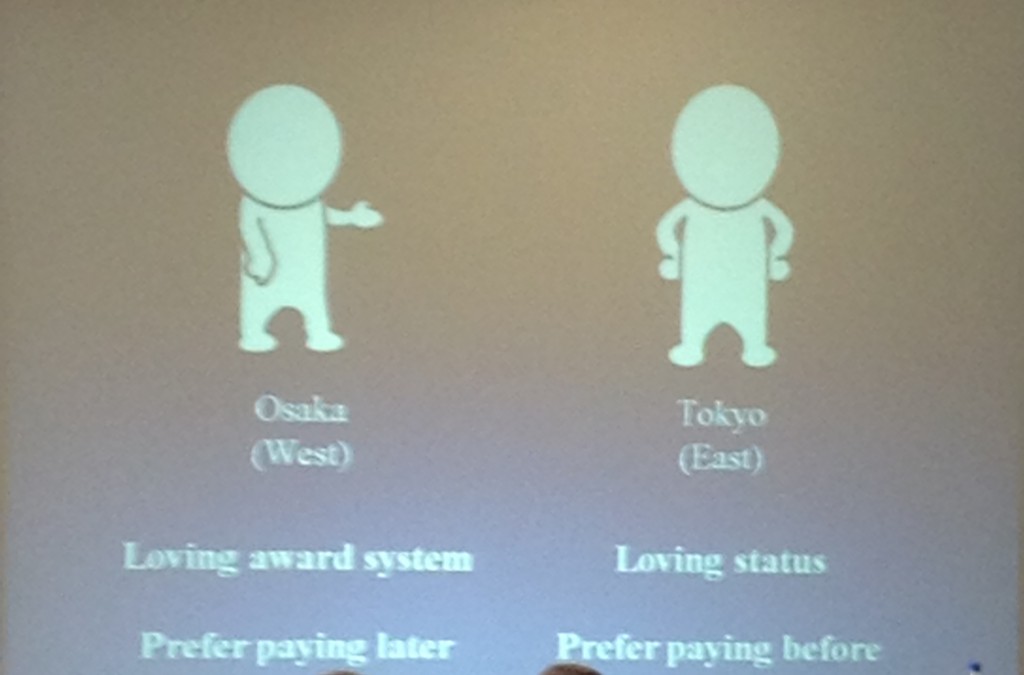

The Western Japanese (Osaka) prefer money and savings, that’s why they like paying after the services are rendered. The Eastern Japanese (Tokyo) are ready to prepay as they respect their high status. This could have been taken further towards the classical opposition of homo economicus (left, fairness) vs homo politicus (status, power)… But together with Koji, we will limit ourselves to a classical conclusion that every client requires a different approach, especially in the translation business.
Israel Shalyt. Intent, Moscow.
Evgeniya Malenova, Omsk.
Engineering and technical translation training.
During this joint presentation, Israel Solomonovich talked about the “eternal”: the translation quality problem, difficulties of translator training, “engineering correctness” and translation vocabulary. It is still unclear what is the engineering correctness of literary translation (heavily used as quotes by Israel Shalyt). I believe, the term “correctness” would be sufficient. In any case, Intent with its leader I. S. Shalyt is about to make training videos for translators available for purchase; this online store is being finished by software writers. I think there will be a high level of interest to this project. I personally plan on buying a video there as soon as it is available. This will help train the staff of our own Alba Longa School of Translation. Professor Evgeniya Malenova after her presentation, which showed a weighed and well-rounded approach to training young translators, did not leave any doubts about a high level of translator training at least at her Omsk University.
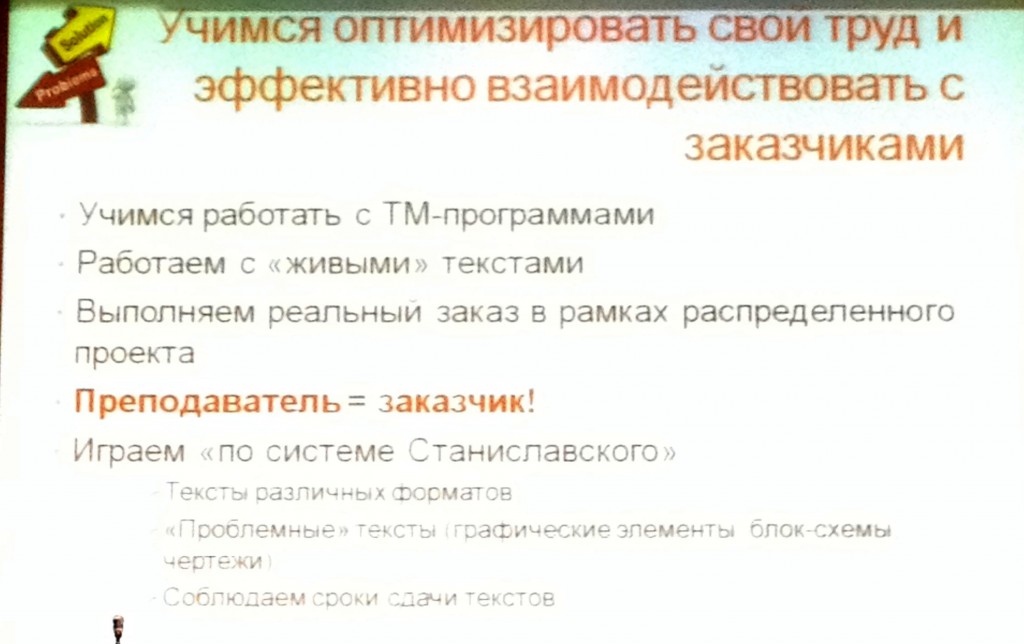

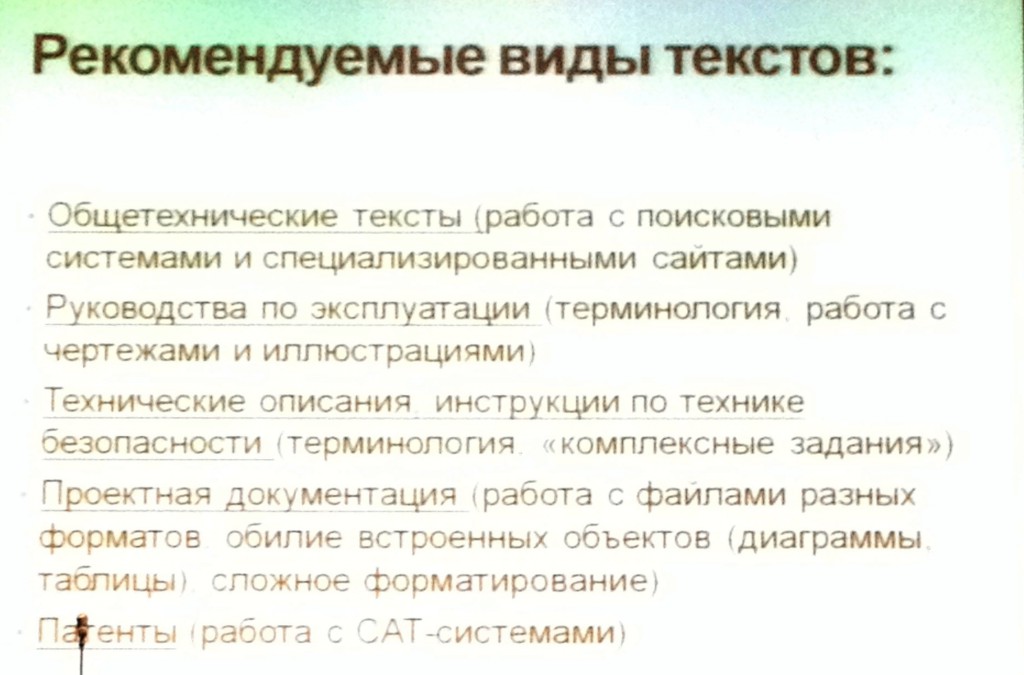

That evening I attended a discussion of the “Translator code of ethics” written by an impressive group of experts. The document contains quite specific recommendations (“Translators shall not initiate a contact with the end customer circumventing the direct customer…”), as well as some obvious ones, which are still reminders (“Dispute resolution by negotiations”, “Informing a customer at all levels”, “Showing mistakes in the original” etc.). There are some redundant and “empty” points, which are self-explanatory (“Compliance with the legislation”, “Accurate pricing”, “Fair competition”). Anyway, as any other legislative initiative in the ethical field, this document will raise many disputes. From my point of view, the wording of the document must be more thoroughly evaluated and worked on, as of now the document is somewhat raw and, in certain places, categorical (“… translator tries to translate exclusively into their native language”.)
At that, the Forum Saturday came to an end, and the guests were awaited at the Gala with beautiful white tables and chairs, a jazz solo, a pleasant networking and a disco.
The first part of Sunday was very pleasant with a large number of presentations from representatives of translation departments of large companies, that are customers of translation services (Uralmash, Enel, Ural Mining and Metallurgical Company). Complaints about the training level of translators and tongue slips—all this traditionally lifted up the mood in the Red Hall. There were many praises said (“this is how professionals must position themselves”) about the presentation by Oxana Gorodnitskaya, the Head of the International Relations Department of the most interesting Ural Mining and Metallurgical Company (the largest holding in the Urals, which is involved in everything: from plane assembly and aerospace services to distance learning and women’s basketball). What is the secret of a successful operation of the translation department under Oxana’s leadership? The answer is composed of several factors: a constant participation of a translator in working groups discussions (you have to lobby and prove this necessity); a translator’s participation in giving tours (of the enterprise and the city); constant metrics (KPI); standardization of work (creating document approval maps, memos on cooperation with other departments); maintaining the department history to raise self-awareness and prestige (with serious and funny facts). How do you have time to do it all? The answer is simple, one must constantly raise their management competence (including reading business literature).
Pavel Dunaev on behalf of the customer (“Sportmaster”) also shared his ideas on how to correctly work with the language during a business internationalization (which is what Sportmaster is undertaking now). We would like to note here a high level of attention to the original material (which must be strictly uniform and written with the ultimate simplicity for translation, similar to military instructions by NATO). We would like to thank Pavel for his eloquent and colorful style of presenting his ideas.
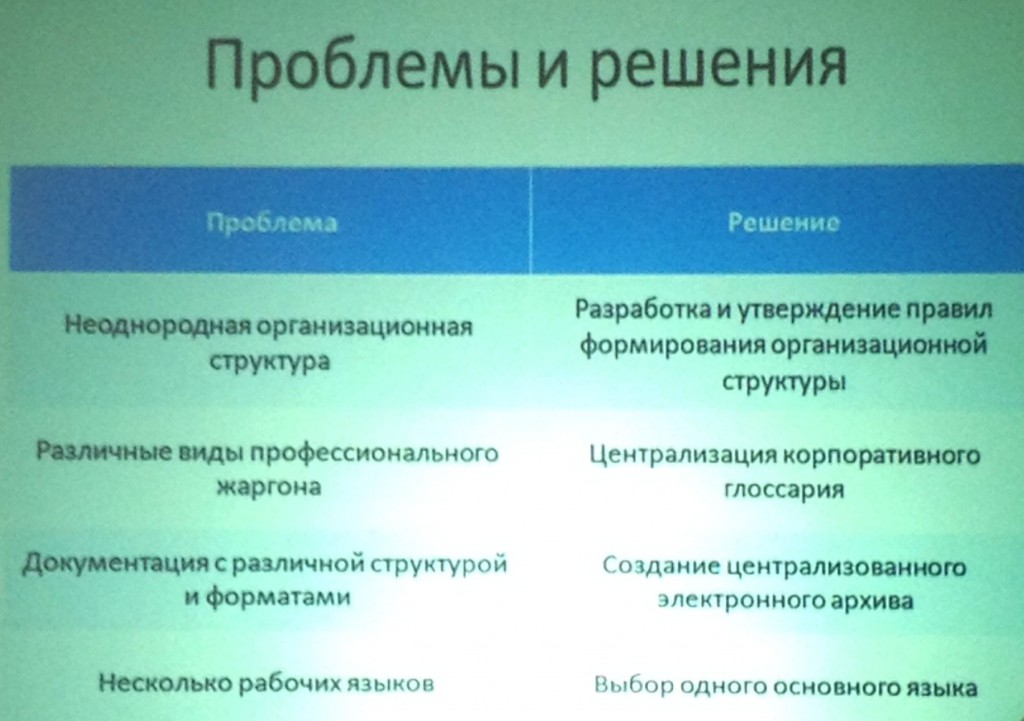

After the lunch break and a great performance by a band of singers of the Forein Languages Department lead by I.V. Lyubavina, I listened to a very clear and well structures presentation by Anastasia Intse from “Pravo i Slovo” (Law & Word) law firm. Anastasia gave several simple but very important pieces of advice on how to raise small business effectiveness in the service industry (“How to increase the revenue of a translation bureau without additional investments. Is it realistic?”) Certain pieces of advice are more relevant to bureaus that work with physical persons and notaries (advertising at neighboring firms; using the wait time; installing vending machines), but there were universal recipes required to increase the operation effectiveness of any respectable firm (addressing the complaints by a form on the website), checking quality after fulfilling the order; secret shopper purchase, which can be known by employees; no “fashionable” employees; constantly check the prices of regular providers who offer non-unique services).
The last TFR session for me was a round table by Konstantin Dranch called “translationrating.ru: Rating and study of CIS translation companies: a further project development”, at the end of which the audience came to the following conclusions:
—the project is needed;
—the project must evolve towards making the criteria more complex (text translation, service level, topic specialization), and additional classification parameters;
—to do it well, Konstantin will need to do a lot of work on the project acquiring additional resources for the rating.
There were words of gratitude spoken at the closing ceremony, and they sounded very sincere. The location of TFR for the next year has not been defined yet, but I would like to personally thank again the organizing committee and Elena Kislova in particular for this grandiose event! The power of translators is in our unity! TRF shall be!
The report was prepared by Fedor Kondratovich, CEO of Alba Longa Translation Company.
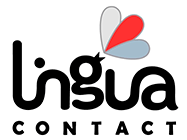
 English
English










